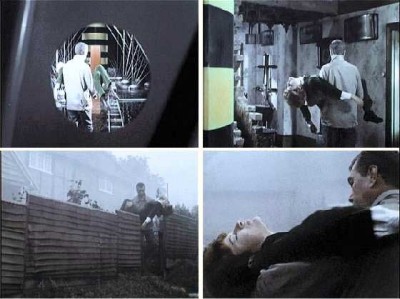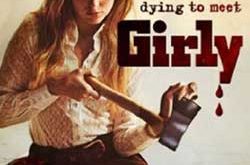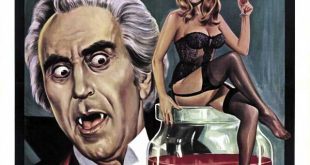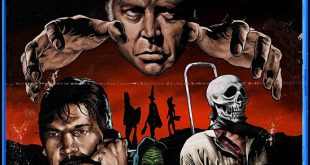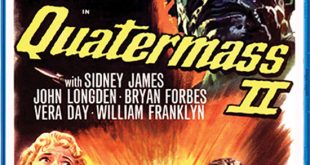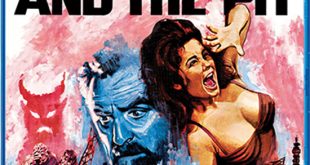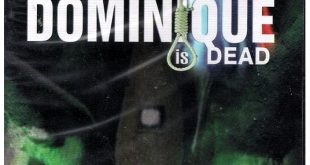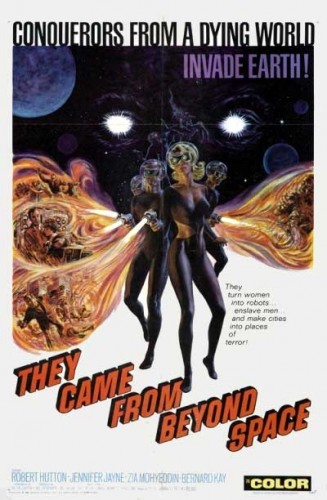 SYNOPSIS:
SYNOPSIS:
“Astronomers investigate a mysterious meteorite shower in a rural English farm field – exceptional because the space rocks all fell in a ‘V’ formation. Doctor Richard Arden, preeminent in the field of extraterrestrial study, is not permitted to accompany his colleagues, including his girlfriend Lee Mason, because he is still recovering from the effects of a recent motor accident. The scientists are summarily taken over by some alien force, and others in the area are dying from a mysterious ‘crimson plague’ which covers their bodies with drops of blood. Temple seems the only person immune to both maladies, so if he can discover the reason for this immunity, he may yet foil the alien plan to take earthlings back to the moon for their own sinister purposes.” (courtesy IMDB)
REVIEW:
The steaming piece of cinema I’m discussing for your inconsideration this week is called They Came From Beyond Space (1967), a rather bland and cosmologically incorrect title that could apply to any one of scores of science fiction films of the era. It was made in Britain and is adapted from a 1964 novel entitled The Gods Hate Kansas – as well they might, for those wacky gods hate a lot of their own creations, but I wonder what they think of plagiarists? This is so obvious a rip-off…I mean, unacknowledged remake of the classic Quatermass II (1955) as to be worthy of Roger Corman. In short, this film is about as original as Disney’s The Lion King (1994).
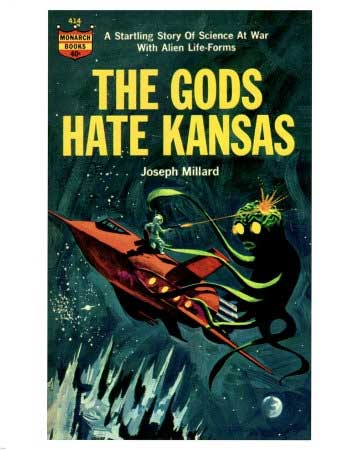 When I tell you They Came From Beyond Space was produced by Milton Subotsky, those familiar with his name will know to expect a watchable film with room for improvement. He did the world a good service when his film Rock Rock Rock (1956) introduced us to the charms and talent of Tuesday Weld. He started Richard Lester’s directing career with It’s Trad Dad (1962). He was responsible for both Doctor Who And The Daleks (1965) and Dalek Invasion Of Earth 2150 AD (1966), but the bigger budget and filming in colour couldn’t conceal the sad fact that, despite creating the Daleks, Terry Nation was never in the first division of British television writers. Milton went on to produce other films that had good moments, such as The House That Dripped Blood (1971), And Now The Screaming Starts (1973) and The Land That Time Forgot (1975). I would hold him in higher regard if he had retired earlier than he did, and not produce Cat’s Eye (1985). People who give Drew Barrymore acting jobs are absolutely evil!
When I tell you They Came From Beyond Space was produced by Milton Subotsky, those familiar with his name will know to expect a watchable film with room for improvement. He did the world a good service when his film Rock Rock Rock (1956) introduced us to the charms and talent of Tuesday Weld. He started Richard Lester’s directing career with It’s Trad Dad (1962). He was responsible for both Doctor Who And The Daleks (1965) and Dalek Invasion Of Earth 2150 AD (1966), but the bigger budget and filming in colour couldn’t conceal the sad fact that, despite creating the Daleks, Terry Nation was never in the first division of British television writers. Milton went on to produce other films that had good moments, such as The House That Dripped Blood (1971), And Now The Screaming Starts (1973) and The Land That Time Forgot (1975). I would hold him in higher regard if he had retired earlier than he did, and not produce Cat’s Eye (1985). People who give Drew Barrymore acting jobs are absolutely evil!
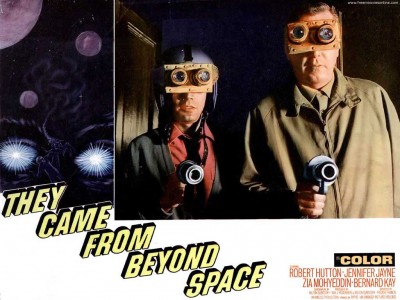 At first, I was shocked to see that not even Lloyd’s Bank of London was safe from alien invasion, but when Lee Mason withdrew one million pounds, I thought this may explain what’s been happening with the world’s banking and investment institutes in recent years. These undeserved executive bonuses are actually being spent on space projects run by aliens – I mean, how often has your bank manager struck you as not being human?
At first, I was shocked to see that not even Lloyd’s Bank of London was safe from alien invasion, but when Lee Mason withdrew one million pounds, I thought this may explain what’s been happening with the world’s banking and investment institutes in recent years. These undeserved executive bonuses are actually being spent on space projects run by aliens – I mean, how often has your bank manager struck you as not being human?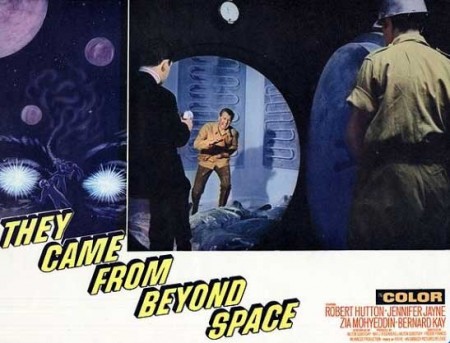
The man most responsible for getting this film wrong was David Lynch’s favourite cinematographer, Freddie Francis, who passed away in 2007, a gifted cameraman but a sadly mediocre director. He started as camera operator on Tales Of Hoffman (1951), George Romero’s favourite movie and the one that inspired him to seek a career in film. Freddie later photographed important British films like Saturday Night And Sunday Morning (1960), and arguably cinema’s best ever ghost story, The Innocents (1961). International films he shot included The Elephant Man (1980), Dune (1984), The Straight Story (1999), the wrong version of Cape Fear (1991), and won Academy Awards for Sons And Lovers (1960) and Glory (1989). For his directing efforts he received no nominations, no acclaim at Cannes, Venice or Berlin, and very few favourable reviews anywhere. They were mostly horror films that weren’t scary, such as Trog (1970), Joan Crawford’s final film – a movie so bad, only Christina Crawford could enjoy watching it.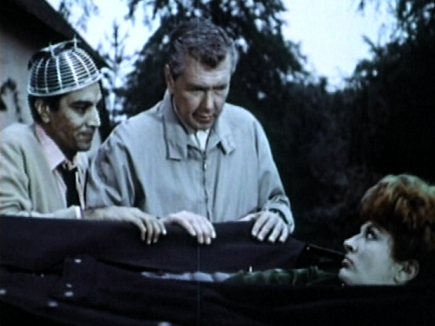
The producers decided an American leading man was needed, but they could only afford the less-than-charismatic Robert Hutton, who died after he broke his back in a home accident. He had been in films since the mid-forties, and you may have seen his work in The Slime People (1963) and Trog (1970) as well as many television shows from the fifties to the seventies. Watching him work, you can see why he didn’t achieve stardom. In this film his vintage car has more personality than he has. He must have borrowed it from John Steed. In fact, the entire film plays like a padded episode of The Avengers and Doctor Temple is Steed, but without the style, charm or wit. And the leading lady doesn’t hold a candle to Emma Peel, either. Lee Mason is portrayed by Jennifer Jayne, a familiar face to British television viewers from the fifties to the seventies. If you are a member of that endangered species you may recognise her as Hedda Tell, William Tell‘s missus from the ITC series.
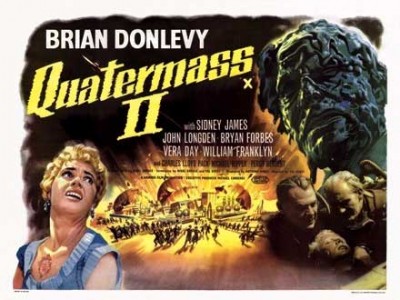 The key name missing from the credits is that of Nigel Kneale, one of the pioneer British television writers. In 1953 he wrote what is probably the small screen’s first high-quality science fiction series, The Quatermass Experiment, and it justly scored high ratings. After digressing to pen a superb version of Nineteen Eighty-Four starring a young Peter Cushing, he wrote Quatermass II, which is the basis for tonight’s movie and regrettably, started a trend for sequels with Roman numerals in their titles. He was invited to contribute to the first season of Doctor Who but refused to write for children. A pity, as any contribution he made would surely have been one of the best stories of that first season. Instead, much to his annoyance, the BBC chose to rewrite Quatermass II and Quatermass And The Pit as the Doctor Who stories Spearhead From Space and The Daemons, and he was absolutely furious to see a key moment from The Quatermass Experiment used in The Ark In Space. He mustn’t have known about this film, or his head would have exploded. Yours may too as you watch the conclusion of They Came From Beyond Space.
The key name missing from the credits is that of Nigel Kneale, one of the pioneer British television writers. In 1953 he wrote what is probably the small screen’s first high-quality science fiction series, The Quatermass Experiment, and it justly scored high ratings. After digressing to pen a superb version of Nineteen Eighty-Four starring a young Peter Cushing, he wrote Quatermass II, which is the basis for tonight’s movie and regrettably, started a trend for sequels with Roman numerals in their titles. He was invited to contribute to the first season of Doctor Who but refused to write for children. A pity, as any contribution he made would surely have been one of the best stories of that first season. Instead, much to his annoyance, the BBC chose to rewrite Quatermass II and Quatermass And The Pit as the Doctor Who stories Spearhead From Space and The Daemons, and he was absolutely furious to see a key moment from The Quatermass Experiment used in The Ark In Space. He mustn’t have known about this film, or his head would have exploded. Yours may too as you watch the conclusion of They Came From Beyond Space.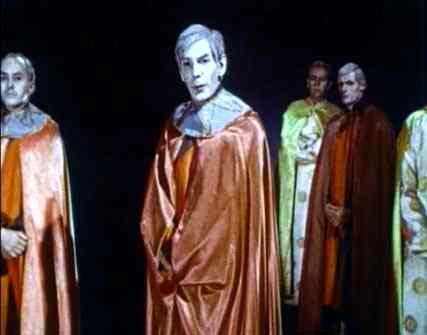
Well, that was a bit of an anti-climax, wasn’t it? And as for that “You only had to ask” business – this all must be taking place in an alternate universe on an Earth with a more generous species than ours. We’d instantly be asking “How much is this going to cost?” There’s no way our governments would spend money on that! Money that could finance a war, or be used as tax cuts for the very wealthy, or bonuses for executives? Who cares about the Moon?!
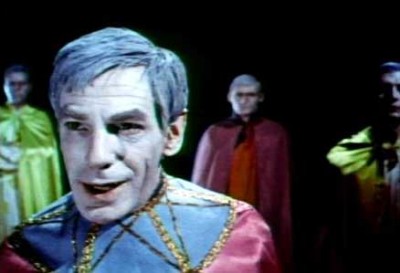 No doubt you recognised Michael Gough as the Master Of The Moon. You’d remember him as Alfred the butler in all four Batman (1989) films of the nineties. He began acting in theatre in the thirties and films in the forties, and was in superb movies such as Richard III (1955) where he helped put a stop to John Gielgud’s scene-stealing – by killing him – and yes, he was also in Trog. Director Tim Burton persuaded him to come out of retirement to appear in both Sleepy Hollow (1999), and his new version of Alice In Wonderland (2010).
No doubt you recognised Michael Gough as the Master Of The Moon. You’d remember him as Alfred the butler in all four Batman (1989) films of the nineties. He began acting in theatre in the thirties and films in the forties, and was in superb movies such as Richard III (1955) where he helped put a stop to John Gielgud’s scene-stealing – by killing him – and yes, he was also in Trog. Director Tim Burton persuaded him to come out of retirement to appear in both Sleepy Hollow (1999), and his new version of Alice In Wonderland (2010).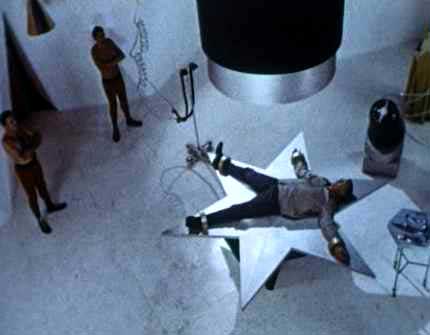
I hope you enjoyed this less-than-reasonable film, but you probably didn’t. I would urge you to track down both the original television series Quatermass II and the subsequent film version, and you’ll discover what a good story this is when it’s done right. While you’re doing that I’ll return to the Public Domain to see if I can run to ground something worth showing you, when you visit Horror News next time. I’m your host, Nigel Honeybone, and I look forward to seeing you then. Toodles!
 Horror News | HNN Official Site | Horror Movies,Trailers, Reviews
Horror News | HNN Official Site | Horror Movies,Trailers, Reviews
